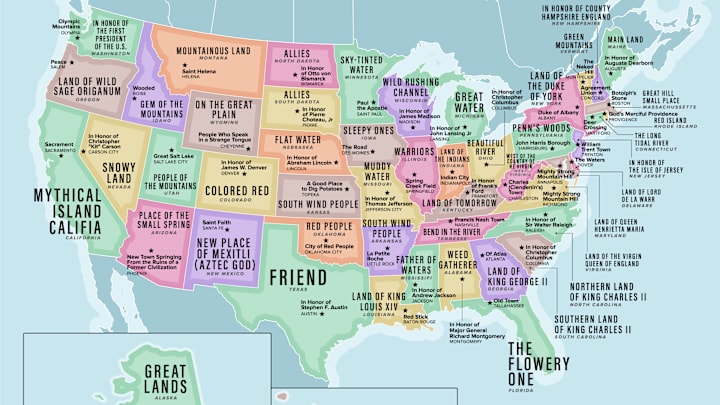The multicultural history of the United States is evident from maps of the country. French, English, Spanish, Hawaiian, and Algonquian are just a handful of the languages you would need to speak in order to understand the literal meanings of every American place name. Fortunately you don’t need to be a polyglot to read a U.S. map like a book; just take a take a look at the graphic below for the English translations of capital city and state names.
To put together this etyomogical map of America, Wordtips pulled from multiple resources, including the American Library Association, the Online Etymology Dictionary, and the Bureau of Indian Affairs. The website used a minimum of two sources to determine each etymology in the report.

Some meanings are fairly well-known. Even if you aren’t fluent in Spanish, you may already be aware that Colorado means “colored red” and Florida means “the flowery one.” If you went to school in Pennsylvania, you likely learned that the state’s name translates to “Penn’s woods” in honor of the British colony’s founder William Penn.
The stories behind some state names are self-explanatory. Michigan, a.k.a. the Great Lake State, comes from the Ojibwe word for “great water.” Other etymologies are less straightforward. The name Alabama is thought to come from the Choctaw words for “weed gatherer,” which may be a reference to the grassy land that was cleared for agriculture.
The map includes the translations of each state’s capital city as well. According to Wordtips, the name of Massachussetts’s capital city Boston means “Botolph’s stone,” and it was named after a town in England that itself was named for the patron saint of travelers. If you understand French, you already know that the name of Louisiana’s capital Baton Rouge means “red stick,” but you may not know it references the actual stick that once marked the boundary between two Native American tribes in the region.
Some literal translations provide all the context you need. The name Topeka, which is the capital city of Kansas, comes from the Kansa-Osage word meaning “a good place to dig potatoes.” Lincoln, Nebraska, is an homage to an American president, as are the cities of Jackson, Mississippi; Jefferson City, Missouri; and the state of Washington. You can check out the full map of literal translations of U.S. place names above. To get a closer look at each translation, you can view an enlarged version of the image here.
As Wordtips notes in their report, etymologies are not always an exact science. Even when language experts are able to figure out the meaning of a place name, the history behind why it got that name in the first place is often lost to time. Many of the common words we use everyday are etymological mysteries. The linguistic roots of dog, bad, girl, boy, log, and curse are unclear and they continue to baffle experts to this day. You can read about those and more words with murky origins here.
